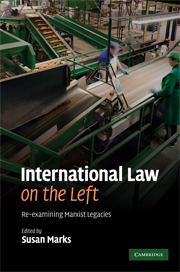Book contents
- Frontmatter
- Contents
- Contributors
- Acknowledgements
- Introduction
- 1 What should international lawyers learn from Karl Marx?
- 2 An outline of a Marxist course on public international law
- 3 The commodity-form theory of international law
- 4 Positivism versus self-determination: the contradictions of Soviet international law
- 5 Marxism and international law: perspectives for the American (twenty-first) century?
- 6 Toward a radical political economy critique of transnational economic law
- 7 Marxian insights for the human rights project
- 8 Marxian embraces (and de-couplings) in Upendra Baxi's human rights scholarship: a case study
- 9 Exploitation as an international legal concept
- Index
1 - What should international lawyers learn from Karl Marx?
Published online by Cambridge University Press: 07 September 2009
- Frontmatter
- Contents
- Contributors
- Acknowledgements
- Introduction
- 1 What should international lawyers learn from Karl Marx?
- 2 An outline of a Marxist course on public international law
- 3 The commodity-form theory of international law
- 4 Positivism versus self-determination: the contradictions of Soviet international law
- 5 Marxism and international law: perspectives for the American (twenty-first) century?
- 6 Toward a radical political economy critique of transnational economic law
- 7 Marxian insights for the human rights project
- 8 Marxian embraces (and de-couplings) in Upendra Baxi's human rights scholarship: a case study
- 9 Exploitation as an international legal concept
- Index
Summary
Introduction
Many claim, or at least suspect, that international law is in a crisis. For some, informal globalisation and the Iraqi war have demonstrated international law's increasing marginality in international life, the growing pattern of violation of its key provisions interpreted as proof of its irrelevancy. For others, the crisis emerges from endogenous origins, from international law's having become yet another aspect of a bureaucratic system of bargaining at Western-dominated international institutions by an ‘international Hofmafia’. While both criticisms have a bite, my interest is drawn directly by neither. Instead, I want to examine the inside of the profession where the crisis sometimes appears as a sense of the loss of international law's emancipatory promise, a creeping scepticism about whether there ever was any such project to begin with.
I have elsewhere told the story of international law's emergence as part of liberal modernity in the latter half of the nineteenth century. That it has been a part of ‘modernity’ has meant that it has been animated by a progressive and universalistic spirit, firm confidence in the ability of liberal political institutions to transform the world into a democratic and rule-governed Kantian Völkerstaat. My sense, however, is that like many other aspects of modernity, the profession of international law has in recent years been bogged down in fruitless and repetitive forms of thinking about the international world; bureaucratic étatism on the one hand, imperial or nostalgic humanism on the other.
- Type
- Chapter
- Information
- International Law on the LeftRe-examining Marxist Legacies, pp. 30 - 52Publisher: Cambridge University PressPrint publication year: 2008
- 4
- Cited by

